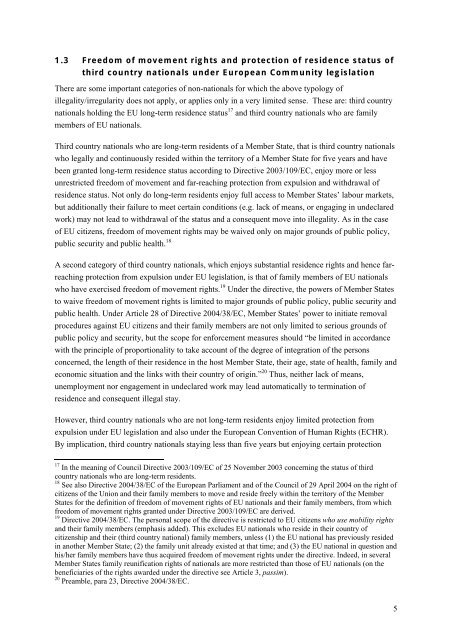REGINE Regularisations in Europe Final Report - European ...
REGINE Regularisations in Europe Final Report - European ...
REGINE Regularisations in Europe Final Report - European ...
Create successful ePaper yourself
Turn your PDF publications into a flip-book with our unique Google optimized e-Paper software.
1.3 Freedom of movement rights and protection of residence status of<br />
third country nationals under <strong>Europe</strong>an Community legislation<br />
There are some important categories of non-nationals for which the above typology of<br />
illegality/irregularity does not apply, or applies only <strong>in</strong> a very limited sense. These are: third country<br />
nationals hold<strong>in</strong>g the EU long-term residence status 17 and third country nationals who are family<br />
members of EU nationals.<br />
Third country nationals who are long-term residents of a Member State, that is third country nationals<br />
who legally and cont<strong>in</strong>uously resided with<strong>in</strong> the territory of a Member State for five years and have<br />
been granted long-term residence status accord<strong>in</strong>g to Directive 2003/109/EC, enjoy more or less<br />
unrestricted freedom of movement and far-reach<strong>in</strong>g protection from expulsion and withdrawal of<br />
residence status. Not only do long-term residents enjoy full access to Member States’ labour markets,<br />
but additionally their failure to meet certa<strong>in</strong> conditions (e.g. lack of means, or engag<strong>in</strong>g <strong>in</strong> undeclared<br />
work) may not lead to withdrawal of the status and a consequent move <strong>in</strong>to illegality. As <strong>in</strong> the case<br />
of EU citizens, freedom of movement rights may be waived only on major grounds of public policy,<br />
public security and public health. 18<br />
A second category of third country nationals, which enjoys substantial residence rights and hence farreach<strong>in</strong>g<br />
protection from expulsion under EU legislation, is that of family members of EU nationals<br />
who have exercised freedom of movement rights. 19 Under the directive, the powers of Member States<br />
to waive freedom of movement rights is limited to major grounds of public policy, public security and<br />
public health. Under Article 28 of Directive 2004/38/EC, Member States’ power to <strong>in</strong>itiate removal<br />
procedures aga<strong>in</strong>st EU citizens and their family members are not only limited to serious grounds of<br />
public policy and security, but the scope for enforcement measures should “be limited <strong>in</strong> accordance<br />
with the pr<strong>in</strong>ciple of proportionality to take account of the degree of <strong>in</strong>tegration of the persons<br />
concerned, the length of their residence <strong>in</strong> the host Member State, their age, state of health, family and<br />
economic situation and the l<strong>in</strong>ks with their country of orig<strong>in</strong>.” 20 Thus, neither lack of means,<br />
unemployment nor engagement <strong>in</strong> undeclared work may lead automatically to term<strong>in</strong>ation of<br />
residence and consequent illegal stay.<br />
However, third country nationals who are not long-term residents enjoy limited protection from<br />
expulsion under EU legislation and also under the <strong>Europe</strong>an Convention of Human Rights (ECHR).<br />
By implication, third country nationals stay<strong>in</strong>g less than five years but enjoy<strong>in</strong>g certa<strong>in</strong> protection<br />
17 In the mean<strong>in</strong>g of Council Directive 2003/109/EC of 25 November 2003 concern<strong>in</strong>g the status of third<br />
country nationals who are long-term residents.<br />
18 See also Directive 2004/38/EC of the <strong>Europe</strong>an Parliament and of the Council of 29 April 2004 on the right of<br />
citizens of the Union and their family members to move and reside freely with<strong>in</strong> the territory of the Member<br />
States for the def<strong>in</strong>ition of freedom of movement rights of EU nationals and their family members, from which<br />
freedom of movement rights granted under Directive 2003/109/EC are derived.<br />
19 Directive 2004/38/EC. The personal scope of the directive is restricted to EU citizens who use mobility rights<br />
and their family members (emphasis added). This excludes EU nationals who reside <strong>in</strong> their country of<br />
citizenship and their (third country national) family members, unless (1) the EU national has previously resided<br />
<strong>in</strong> another Member State; (2) the family unit already existed at that time; and (3) the EU national <strong>in</strong> question and<br />
his/her family members have thus acquired freedom of movement rights under the directive. Indeed, <strong>in</strong> several<br />
Member States family reunification rights of nationals are more restricted than those of EU nationals (on the<br />
beneficiaries of the rights awarded under the directive see Article 3, passim).<br />
20 Preamble, para 23, Directive 2004/38/EC.<br />
5
















